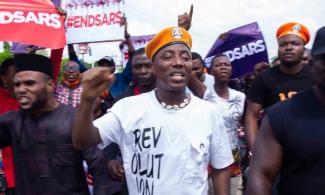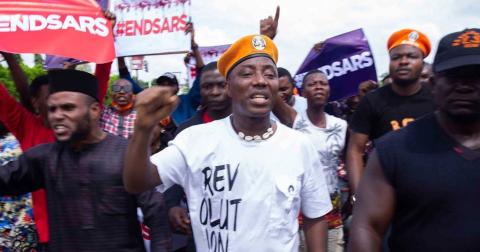
Sowore led over 5,000 students in protest against the Nigerian government in 1992 – the military junta of Gen Ibrahim Babangida (retd.). During the protests, the police started shooting and seven people were reportedly killed.
Among millions of Nigerians, human rights activist and publisher of Sahara Reporters, Omoyele Sowore, is known for pro-democracy and anti-corruption campaigns which have heightened in the last three decades.
This is despite several bogus trials by the Nigerian government - with the recent episode being the arrest, torture, and prosecution of Sowore on December 31, 2020, for leading a crossover night protest to demand good governance and mobilise Nigerians to rise against bad policies, corruption, and ineptitude of the government.

Sowore, born February 16, 1971, is being tried by the Nigerian government for several trumped-up charges.
Celebrating his 50th birthday today, the human rights activist cut his teeth in activism, defence of human rights, and protests against bad governance during his undergraduate days at the University of Lagos in 1989 and by 1992, he was already elected as the Students’ Union President of the school.
He was in office till 1994.
In 1989, he took part in student demonstrations protesting the conditions of an International Monetary Fund loan of $120 million to Nigerian for just an oil pipeline.
Among the conditions of the IMF loan was to reduce the number of universities in the country from 28 to five.
Sowore led over 5,000 students in protest against the Nigerian government in 1992 – the military junta of Gen Ibrahim Babangida (retd.).
During the protests, the police started shooting and seven people were reportedly killed. Sowore was thereafter arrested and tortured.
Due to his activism and brave criticisms of authorities and repressive policies, Sowore spent two extra years in the university.[story_link align="left"]88841[/story_link]
He was also involved in the demand for an end to military rule following the annulment of the election of June 12, 1993, widely believed to have been won by Chief Moshood Abiola.
This resulted in several arrests, detentions, and life-threatening treatment by government officials.
In January 2017, the Lagos State Police Command arrested Sowore over a petition by a magazine publisher, Lekan Fatodu. The police assaulted Sowore at the Area F Police Command, Ikeja, an incident that drew the condemnation of many Nigerians.
In August 2019, Sowore was arrested by the Department of State Services, ahead of a planned nationwide #RevolutionNow protest.
The arrest prompted massive public outcries, as the Nigerian government, which later admitted to the arrest of Sowore, was roundly condemned by notable Nigerians, including Nobel laureate, Prof Wole Soyinka, Dr. Oby Ezekwesili, and human rights organisations such as Amnesty International.
In the same year, Amnesty International declared Sowore as a prisoner of conscience.
In September 2019, Sowore was granted bail by the Federal High Court Abuja, on the condition that he surrender his international passport within 48 hours.
In defiance of the court order, the DSS refused to release Sowore claiming ignorance of the court order.
The DSS' refusal to release Sowore led to protests at the United Nations Building in New York led by Sowore’s wife, Opeyemi. The Nigerian government’s crude action sparked a global decry on Nigeria's failed democracy. [story_link align="left"]90300[/story_link]
On 29 September 2019, Sowore made his first appearance in the media since his detention. He spoke about his poor treatment and being locked up in a dark room without the sunlight.
He also mentioned that “Boko Haram commanders who are engaged in high-level terrorism have access to telephone, television and even cable in their cells.”
The court again set Sowore free on December 5, 2019, confirming that he had settled his bail conditions.
However, the DSS again demonstrated crude desperation and ridiculed the government in public glare when their operatives invaded the court premises and re-arrested Sowore.
He was finally released on December 24, 2019.
The DSS has continued in desperation to try Sowore its bogus allegations of calling for a revolution, despite no evidence.
In December 2020, a DSS agent, Rasheed Olawale, told a Federal High Court sitting in Abuja that he was in the secondary school when he heard that President Muhammadu Buhari overthrew a democratically elected government of late Alhaji Shehu Shagari in 1983.
He added that there was no record of revolution in any part of the country on August 5, 2019, which led to the arrest of the human rights activist, Omoyele Sowore.
He disclosed this during his cross-examination by the defence counsel, Femi Falana (SAN), at the resumed hearing of the case.
The DSS witness noted that there was no record of revolution in any part of the country on the said date.
Olawale told the court that he was part of the team which arrested Sowore on August 3, 2019, in Lagos State for allegedly planning a revolution protest to overthrow President Buhari.
He told the court that intelligence reports at their disposal revealed that Sowore was planning a revolution protest on August 5, 2019, but there was no violence or revolution on the said date.
Falana also asked the witness if he was aware that President Buhari led a coup to overthrow a democratically elected government of Shehu Shagari in 1983. The witness said he heard about it as a teenager during his secondary school days.
The lawyer also asked if he was aware that President Buhari had in 2011 called for a revolution but the witness said he could not recall and was not aware.
When asked if he was aware that those who participated in the protest in Lagos, Ogun, Ondo, and Cross Rivers states were charged for unlawful assembly at a Federal High Court in Lagos and they had since been discharged and acquitted, Olawale again denied the knowledge.
As the DSS' desperate trial continues, the Nigerian government on December 31, 2020, again crossed Sowore’s path when it brutally invaded a peaceful protest by harmless citizens calling for good governance and protesting against corruption in government.
He and other activists spent the wee hours of the New Year in police custody for holding a protest.
Sowore had before his arrest, sent out a series of tweets calling on Nigerians to join him on a protest against the regime of President Muhammadu Buhari.
He had tweeted, “How about a crossover protest/uprising tonight? Anyone willing to participate? Pick up a candle and a placard showing your grievances against the regime; let’s upload our short videos and photos across our social media platforms. Let’s welcome the regime to a resolute 2021!
“#CrossoverWithProtest against tyrant @mbuhari’s regime, candlelight for #LekkiMassacre; a placard for #EndBadGovernment; procession to usher in #Revolutionary 2021, a fist for victims of repression-frozen bank accounts, malicious prosecution and detention of #Endsars activists.
“#Crossoverwithprotest starts at 11.30 till 12.30 am across Nigeria, a candle, a placard, and fireworks to usher in a RESOLUTE 2021 in Nigeria! Join with your friends and neighbours #EndSARS. #ObigboMassacre #LekkiMassacre #EndBadGoveranceInNigeria #BuhariTrainwreck #RevolutionNow.”
Scores of armed policemen around midnight, however, swooped on the protesters at Gudu Junction, injuring some of them in the process.
They were subsequently taken to a police unit infamously known as ‘Abattoir’ in the Lokogoma area of the Federal Capital Territory.
The arrest again drew condemnations from various rights groups and notable Nigerians, asking the Nigerian government not to disregard the right of Nigerians to free assembly and to protest.
At the centre of the government’s plot to silence Sowore is the Minister of Justice and Attorney-General, Malami Abubakar, who is using the DSS and the police to frustrate harmless, civilian protesters.
Despite intimidation by the government, Sowore has said he is unperturbed and will continue to fight for good governance, democratic principles, and the right of Nigerians to a quality lifestyle.
Speaking a programme on VoiceTV, earlier in the year, Sowore reminded his adversaries that he started going to detention in 1992 when he was 21 years old fighting for the rights of common Nigerians and speaking against bad leaders.
According to him "What I was fighting for in those days was for this country to have democracy and democracy came.
“Most of them when we were student leaders, they were hiding under their beds. The moment the country was liberated, they came out. Some of them with stolen wealth, some of them were drug dealers, drug addicts, kidnappers, and armed robbers.
“They put on new garbs and became governors, senators, and members of the House of Representatives who you see today; other decent positions, which are supposed to go to decent Nigerians, were allotted to these criminal elements.
“They don't want a society where anything works. But for us who are asking for a better society, we are the enemies of the state. So we are dealing with a criminal state. We are not surprised; I have been through this for over 30 years of different persecution.
“Governance in Nigeria has become a criminal enterprise, with the wrong people governing. It is very important to understand the context in which oppression operates. When you have an oppressive system and a tyrannical government, it is a system that empowers criminals in society. That is the kind of society they want, to create division and bigotry.
“When I was in the university, I was fighting against secret cults. The university chose to expel me alongside secret cult members we were fighting. When we fought back, they readmitted us with those secret cults. Many of the secret cults we were fighting got better jobs than we did. They graduated before me. Many of them even got their National Youth Service Corps assignment before me.”
He said the only way the government could have the trust of Nigerians was to deliver on those social contracts known to be the responsibility of the government.
“People cannot just trust the government because it is walking around with handcuffs and AK-47 rifles, television, and social media propaganda. Trust comes out naturally. It comes out between the governed and the governors, but that is not the case in Nigeria,” he had stated.